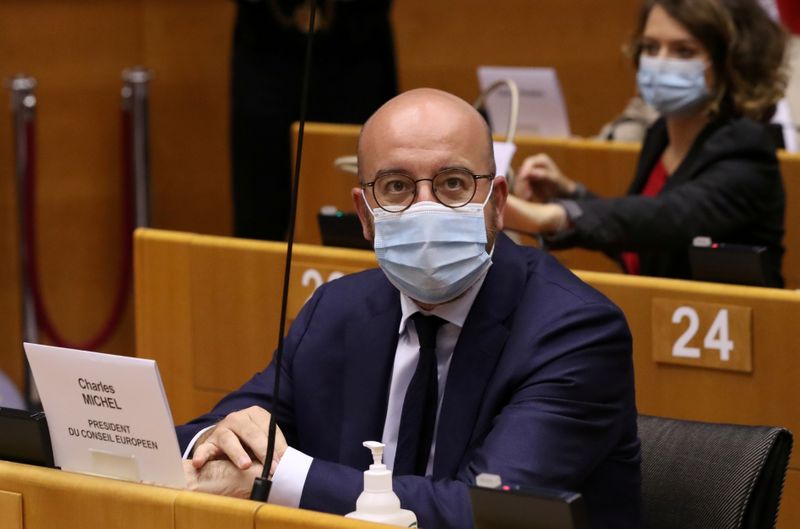By Gabriela Baczynska and Marine Strauss
(Reuters) - European Council President Charles Michel on Friday sought to offer concessions to countries across the EU in plans for the EU's long-term budget and economic recovery, hoping to bridge differences between national leaders when they meet next week.
Michel, who will chair the first face-to-face meeting of European Union leaders since coronavirus lockdowns were lifted, proposed a smaller 2021-27 budget in a bid to make a mass economic stimulus more palatable to thrifty northern countries.
He proposed a long-term EU budget of 1.074 trillion euros - down from the European Commission's suggested 1.094 trillion - and a recovery fund of 750 billion euros for pandemic-hammered economies, with two-thirds in grants and a third in loans.
"The COVID-19 crisis presents Europe with a challenge of historic proportions," Michel said in a statement. "We are slowly exiting the acute health crisis. While utmost vigilance is still required on the sanitary situation, the emphasis is now shifting to mitigating the socio-economic damage."
The COVID-19 pandemic is the latest big challenge for the 27-nation EU after it struggled with a debt crisis a decade ago, chaotic mass migration, and then the trauma of Brexit.
Some leaders have even framed it as existential for the bloc, saying it cannot be seen to fail this time as eurosceptic feeling mounts in countries such as Italy.
Michel proposed maintaining the so-called rebates that wealthier countries receive on their budget contributions and, in a couched reference to Poland, Hungary and others, said funding would be conditional on respect for the rule of law.
An EU diplomat from one of the larger member state called the plan "a good basis" for further negotiations ahead of the summit but cautioned "not everyone will agree on everything".
COMPLEX BUT CRITICAL
Michel proposed allocating a share of the recovery funds on the basis of economic declines, which means debt-burdened countries in the south like Italy and Greece will stand to benefit because they have been hit hardest by the pandemic.
The proposal for the seven-year budget is known in Brussels jargon as the "negotiating box", a complex set of numbers covering spending on areas from support for agriculture to regional development, research and scholarships.
This is the starting point for negotiations between the 27 national leaders when they meet on July 17-18.
EU summits that involve money are always the most fraught, and sometimes haggling goes into an extra day or two, which is why leaders often pack for a "four-shirt" trip to Brussels.
Although setting the budget - called the multiannual financial framework (MFF) - is an arcane process, the stakes are high because such huge sums are involved.
This time, the negotiations are even more critical and complicated because the leaders will also try to agree on the recovery fund, and member states are trying to trade concessions in one against benefits in the other.
In a signal that there is a long road ahead before agreement on the EU budget, which will have to be ratified by the European Parliament, a leader of the conservatives group in the EU assembly served warning that Michel's proposal fell too short.
Siegfried Muresan said in a tweet that parliament could not accept an overall budget below the European Commission's proposal, adding: "A smaller MFF will jeopardise EU support to our researchers & students. It will prevent us from tackling climate change or improving citizen's security."
